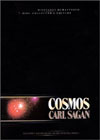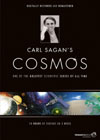Data Capsule Review
|
|
by Martin Izsak
|
Without a doubt, this proves to be one of the most definitive episodes of
the original Cosmos series. One particular philosophical divide becomes
the central theme of the episode, and part-way through this theme is
picked up by the central figure of the most memorable and extensive
historical re-enactment that the original Cosmos features.
Jaromir Hanzlik plays the adult Johannes Kepler with greater emotional depth
and a more moving performance than is found in any other re-enactment on Cosmos.
After this, the final triumph and tragedy of Kepler is well set to confirm Sagan's
ultimate preference on the philosophical question of the episode.
However, the episode is off to a bit of a rough start at first. Even though
I don't personally care much for astrology, it still pains me to watch Sagan
invent so many daft assumptions about modern astrology and then use those as
reasons to dismiss the entire school of thought on the subject. He's a bit too
keen to sweep it all away as worthless nonsense, and may indeed alienate many
people who follow it who might also have been interested in his astronomical ideas
as well.
|
Participants include:
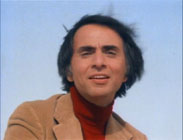 |
Dr. Carl Sagan
Astronomer, host, narrator
|
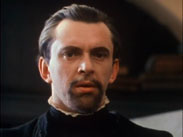 |
Jaromir Hanzlik
Actor, Czech Republic, who plays:
Johannes Kepler
The First Astrophysicist,
the last scientific astrologer.
●discoverer of the laws of orbital motion
|
|
|
Is astrology really as concerned with pinpoint predictions as he assumes
it must be? Are planetary motions really meant to be the cause of everything?
(It seems that astronomers keen to blame impacts from comets and other things
for every major creation of new life and extinction of old
are more prone to this belief than astrologers.) Somehow I don't have any faith
that most of the people checking out their horoscopes are subscribing
to the beliefs he is dismissing as "astrological".
Any daily horoscope listing would have to be applicable to 1/12 of the population
anyway, so you'd have to be pretty daft to expect it to work like a scientific
hypothesis. I only expect astrology to possibly have an inkling of what type of challenges
may come up for 1/12 of the population. Those individuals who are skilful at handling
those challenges may "nip them in the bud" before even noticing any "trouble" in their lives,
while those who haven't figured certain skills out yet might be quite stuck and frustrated
with these things. Yes, a lot of generic advice comes out of these horoscopes, but then
life's solutions are often quite basic, and have been said countless times before.
Our media works in part by finding new ways to make the old classic statements
feel fresh and current, and if astrological cycles get people interested,
it could prove to be a good thing.
Besides it's not as if the chain of cause and effect begins with a person's
birth, and then we check to see how Mars and moon and the sun are "affecting" us.
It's more like the soul has certain things it wants to work out and be challenged
with in a physical life, and it is therefore drawn to be conceived at an appropriate
time and place surrounded by appropriate creatures who can play complementary roles
in any ensuing drama - and if part of that ideal environment coincides with
the position of Mars or the time of year, and whatever known or unknown energies
might be peaking or waning at that time, so be it. I agree that the people
and possibly the century have larger roles to play than the planets, but I wouldn't
dismiss the "lesser" of those influences without knowing more.
On another point, do we really know that "the gods" were based on actual celestial bodies,
rather than ancient astronauts mentioning where they came from?
Is it perhaps only modern scientists and archaeologists
who believe that ancient man couldn't tell the difference?
Perhaps it's harder for modern man to tell the difference,
if he refuses to believe that either "the gods" or ancient astronauts exist.
All that said, I too would prefer reading a weekly astronomical column. Perhaps
the challenge there is that it's less often that something truly fresh and fascinating
can come out which also can withstand all the accompanying scientific rigour.
At any rate, Sagan pretty much has to dabble in astrology to tell this story,
because it is the ancient astrologers who held all the meticulous observations
and data out of which the new science of astronomy could be extruded. In other
words, there was a time when no one cared about the difference between the two
ideas. What astronomy largely removed was in fact superstition. I think the
more we can target superstition, assumption, and jumping to conclusions as the
antagonist of this tale, the cleaner we'll be able to tell it and enjoy it.
And though the audio and visuals are still cool during the opening,
it isn't until Sagan begins to explore different interpretations of
constellations around the campfire that his story actually gets good and enjoyable,
and takes off into excellence.
I particularly like the section contrasting
the geocentric (Earth-centered) view of the universe championed by Ptolemy with
the heliocentric (Sun-centered) view championed by Copernicus,
especially when the very nifty mechanical machine prop is used to demonstrate
the difference and the various angles of line-of-sight between Earth and Mars.
A classic sequence.
But it is indeed a very strong backbone to the episode when the story of
the life of Johannes Kepler takes over just before the midpoint. I often wonder
exactly what directors Geoffrey Haines-Stiles and Tom Weidlinger had to go on
in creating the basic gist of the scenes here, if indeed the mostly voice-over script
wasn't written by Ann Druyan and Steven Soter until AFTER the scenes had been
shot across Germany, Austria, and the Czech Republic. Would our writing team
have wanted anything significantly different? Did some sections deserve more focus or less?
At any rate, the end product is a gripping tale of perseverance for meticulous
detail and accuracy, and a tale of tragedy, triumph, and revelations both true and false.
It is a statement of the struggles of science, and of the Human condition. It paints
a fully-rounded dramatic picture.
"Harmony of the Worlds" remains one of the signature episodes of the original
"Cosmos" series, and a highlight to look forward to as one goes through the show.
|
International Titles:
Deutsch: Unser Kosmos - "Harmonie der Welten"
Español: Cosmos - "La armonía de los mundos"
Magyar: Kozmosz - "Világok harmóniája"
Русский: Космос - "Гармония миров"
Français: "L'harmonie des mondes"
Italiano: "L'armonia dei mondi"
|
|

|
The Music - Episode 3 - Harmony of the Worlds
(Anything written in green text
represents a name I made up to help keep some music better identified in my own head.)
(Golden yellow backgrounds indicate selections that also appear on Voyager's Golden Record.)
| Collectors' Edition 2000 (DVD) |
Original 1980 | |
| Composer/Performer | Title 2000 |
Composer/Performer | Title 1980 | Notes |
| Vangelis | Symphony to the Powers B, Movement Three
also known as "Theme from Cosmos" |
Title Music |
| Wm. Jeffery Boydstun |
|
Leos Janacek | Sinfonietta - Sokol Festival
alternating Mvmt. 1 & 2 of 5 |
| Galt MacDermot | Aquarius (1976 "Hair" film soundtrack version) | New York 1979 |
| Richard Harvey | Migration | Supersister | Dreaming Wheelwhile | |
| Brian Eno | M386 - from the album "Music for Films" | traffic |
| ?? unknown | ??? unknown (quiet orchestral suspense) |
Pulsar | Fear of Frost |
| Wm. Jeffery Boydstun |
|
Gary Numan | I Nearly Married a Human |
City to country
at sunset |
| Gustav Holst | The Planets - Neptune
|
Alexander Scriabin
Isao Tomita
n/a |
Poem of Ecstasy
The Unanswered Question
no music | 10:50... |
| J.S. Bach / Isao Tomita | The Sea Named "Solaris" | 15:00... |
| Trad. Navajo | Night Chant (from Voyager's Golden Record) |
Trad. Navajo /
Sandoval Begay | Night Chant (probably "Cry from the Earth", Side A, Track 5... but pitched down ~2 semitones) |
| J.S. Bach / Isao Tomita | The Sea Named "Solaris" | |
| Larry Fast / Synergy | Paradox (Part B: Icarus)
(contains "Icarus" composed by Ralph Towner with
"Largo: New World Symphony" composed by Antonin Dvorak,
in a merged arrangement
by Larry Fast). This track is also known simply as "Icarus". |
| Gustav Holst | The Planets - Neptune | Orbit machine |
| Dmitri Shostakovich |
| Symph. 11 Mvmt. 1 - "The Palace Square", part B - Kepler's Theme |
| What's this? |
| intro Kepler |
| Dmitri Shostakovich | Symph. 11 Mvmt. 1 - "The Palace Square",
part A | |
| George Crumb | Black Angels, Movement 3 - Return | |
| Dmitri Shostakovich | Symph. 5 Mvmt. 3,
"Holy Geometry" excerpt | |
| Wm. Jeffery Boydstun | Before Science, Cue 2 |
Leos Janacek | Sinfonietta - Sokol Festival
Mvmt. 3 of 5 | |
| Antonio Vivaldi | Concerto for 2 Trumpets in C Major
RV 537, Movement 1 |
William Croft | Voluntary for Organ and Trumpets
(final section) |
Kepler:
child to adult |
| George Crumb | Black Angels, Movement 3 - Return | |
| Dmitri Shostakovich | Symph. 5 Mvmt. 3,
"Lost Cause" excerpt | |
| Dmitri Shostakovich | Symph. 11 Mvmt. 1 - "The Palace Square",
part A | |
| Dmitri Shostakovich | Symph. 11 Mvmt. 2 - "The 9th of January"
|
Carl Nielsen | Symphony No. 5, Mvmt.1
(middle action) | Time of War |
| Dmitri Shostakovich | Symph. 11 Mvmt. 1 - "The Palace Square",
part A | |
| ?? unknown | ?? unknown - "Tycho's court" source music | Tycho's Court |
| Richard Wagner | Lohengrin - Prelude to Act 1 | |
| Larry Fast / Synergy | Icarus | |
| ?? unknown | ?? unknown (slow medieval lament) |
| Vangelis |
| |
| Graham de Wilde | Lifestream
(formerly listed as Orbit Loopdown) |
Terry Riley | Persian Surgery Dervishes:
Performance Two, Part 1 (~5:15 in) | 46:15 - 47:49 |
| Edgar Froese | Drunken Mozart in the Desert ("Solar Clockwork" excerpt) |
Kepler calculates
true orbits |
Graham de Wilde
& Peter Cox | A History of Conflict
(First version - full 2:22 duration) |
Jean-Baptiste Lully
Henry Purcell
Jean-Baptiste Lully
Henry Purcell
|
March of the King's Musketeers
(drum intro)
Funeral Music for Queen Mary
March #1 (brass & drums)
March of the King's Musketeers
(drumming only)
Funeral Music for Queen Mary
March #2 (brass only) |
| Vangelis | Theme from Cosmos | |
| George Crumb | Black Angels, Movement 3 - Return | |
| Dmitri Shostakovich | Symph. 11 Mvmt. 1 - "The Palace Square",
part B - Kepler's Theme | |
| Vangelis | Theme from Cosmos | Closing Theme,
End Credits |
| Vangelis | Comet 16 | n/a | Collector's Edition
2000 Credits |

Isao Tomita
Kosmos
Pioneering electronic renditions
of various classical compositions
Audio CD
|
Tomita - Kosmos
Links also lead to mp3 version...
|
Tomita - Kosmos:
All Tracks performed by Isao Tomita
This album available on CD or MP3 download.
Track Listing:
1. Star Wars: Main Title (John Williams, 3:05)
2. Space Fantasy (Tomita, 9:17) containing:
- Also Sprach Zarathustra, section 1 of 9 (Richard Strauss)
- Ride of the Valkyries (Richard Wagner)
3. Pacific 231 (Honegger, 6:48)
4. The Unanswered Question (Charles Ives, 6:22)
5. Aranjuez (Rodrigo-Tomita, 6:23)
6. Peer Gynt, Suite No. 2: Solveig's Song (Edvard Grieg, 4:49)
7. Hora Staccato (Dinicu-Heifetz, 3:29)
8. The Sea Named Solaris (J.S. Bach - Tomita, 12:35)
|

Synergy
Sequencer
Original music
performed by
Larry Fast as Synergy
Audio CD
|
Sequencer 1976
All Tracks performed by Larry Fast recording as Synergy
Track Listing according to amazon's mp3 version:
1. S-Scape (5:46)
2. Chateau (4:17)
3. Cybersports (4:39)
4. Classical Gas (3:02)
5. Largo, New World Symphony (3:48)
6. Icarus (3:14)
7. Sequence 14 (11:20)
|
Sequencer 1976
All Tracks performed by Larry Fast recording as Synergy
Track Listing according to discogs.com:
1. S-Scape (5:50)
2. Chateau (4:16)
3. Cybersports (4:39)
4. Classical Gas (3:00)
5. Paradox (Part A: Largo, New World Symphony) (3:40)
6. Paradox (Part B: Icarus) (3:20)
7. (Sequence) 14 (11:14)
|

Edgar Froese
Stuntman
Original music
composed by
Edgar Froese
Audio CD
|
Froese: Stuntman - Physical Audio CD:
Edgar Froese - Stuntman
This album available on CD or MP3 download.
Track Listing:
1. Stuntman (4:18)
2. It Would Be Like Samoa (10:46)
3. Detroit Snackbar Dreamer (6:33)
4. Drunken Mozart in the Desert (10:00)
5. A Dali-esque Sleep Fuse (8:33)
6. Scarlet Score For Mascalero (4:20)
|
Froese: Stuntman - Mp3 Album:
Edgar Froese - Stuntman
This album available on CD or MP3 download.
Track Listing:
1. Stuntman (4:18)
2. It Would Be Like Samoa (10:46)
3. Detroit Snackbar Dreamer (6:33)
4. Drunken Mozart in the Desert (10:00)
5. A Dali-esque Sleep Fuse (8:33)
6. Scarlet Score For Mascalero (4:20)
|
This documentary has become available on DVD.
Cosmos - by Carl Sagan: A Personal Voyage
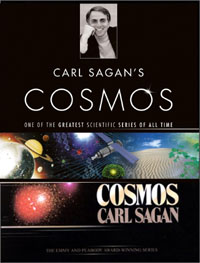
13 hour-long episodes, 1980
|
U.S.


| Canada


| U.K.


|
Comments on this article are welcome. You may contact
the author from this page:
Contact page
|
